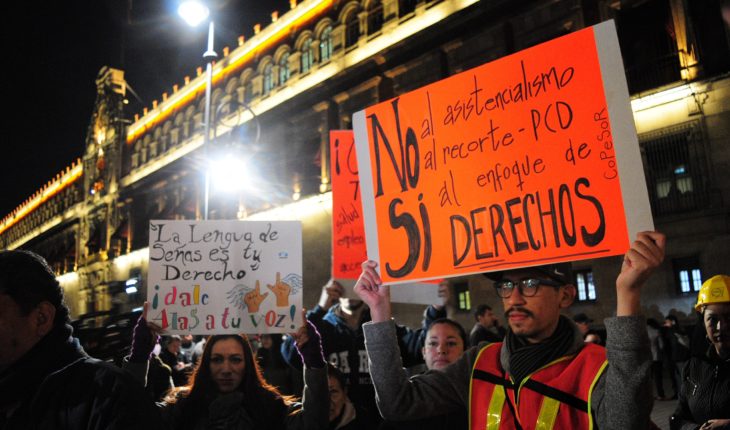cuts the federal government invested during the year just ended, an average of 13 thousand 800 pesos for each inhabitant of the country in the category of Social expenditure, which covers with regard to education, health, care and safety
Social, it revealed an investigation of gender equity, citizenship, work and family organization. The authors warn that this amount will be reduced in 2019 with the cuts set out in the budget of expenditures to vulnerable groups, who will have to take on their own what can not give them the State.
The 13 thousand dollars per capita spent on 2018 because include expenses that are part-financed parties equal by companies and holders of rights – such as the Social Security-, because without this sector, the amount falls to five thousand 600 pesos. This means, according to the report, that the claimant population is covering along with the State Social spending, and enjoys greater support because you pay through their contributions.
This distribution of spending in the budget of expenditure of the Federation (PEF), in addition to insufficient is discriminatory, in accordance with the research; Since federal Social spending (31% of the PEF 2018), less than half is devoted to the total population (13%) and the rest receive it only the claimant population (18%), i.e. the formal workers.
“We would expect that for a society as the Mexican, with high levels of poverty and inequality between women and men, are allocated large amounts of resources to social spending,” respect the text.
This happens in a country where more than half (56%) of workers are in the informal sector, according to the National Institute of statistics. “Put another way, most of the social spending are resources that apply only for IMSS users people”, says ‘Diagnosis of joint responsibility of the State in the work of care’, conducted by the civil association in partnership with the National Commission of human rights (CNDH).
This inequality will get worse with the contemplated cuts in PEF 2019 for social supports such as attention to people with disabilities and childcare, which are spaces for the children of mothers without social security, i.e. informal. This sector, which of itself lacks many benefits by not having a formal employment, it will be particularly affected by the consequences of the cuts, he warned one of the authors of the diagnosis, Lucía Pérez Fragoso.
LEE: Disabled people are protesting against cuts in budget of AMLO the researcher explained political Animal to childcare were created as a program of support to mothers without formal employment, when the economic crisis forced to that more women worked, not by choice but by necessity. “But as it has been one little cared for informality, everything that is assigned and regulates is in relation to formal employment and the formal care;” These rooms are to fill that gap so large all women who do not have formal work,”he said.
Until the presidential term that just concluded, Enrique Peña, the program was in charge of the Social Development secretariat, which changed its name to the Welfare Secretariat in the new Government of Andrés López Manuel Obrador. For 2018, that instance granted support to the population not covered generating care “under requirements and conditions much more lax than daycare requirements”, says the report, and also with resources, much lower than the contributory.
According to this calculation of the diagnosis, during 2018 the federal Government allocated mil 150 pesos a month per child in childcare. “It is very little, in comparison of what assigns the State to care for other children. Although it is taxable because a third party puts her mother, another State and another company, is still putting much more money for those who have formal employment. These are the injustices,”said Fragoso Perez.
Childcare will receive half of those resources which were few, for 2019 childcare will receive only half, because the expenditure budget allocated 2,000 41 million pesos for this program, compared to the four thousand 70 million erogados in 2018. This controversial decision was not accompanied by an argument explaining how will cover 313 thousand children attending stays, or if the deleted resource will be allocated to another category that will result in better care.
“If took you money because they are going to become a better program, it’s good, but that’s what we don’t know.” If you are attending more than 300 thousand children and they take half of the money, I would like to say that they will attend the half. What will happen to those others? “, questioned the expert in feminist economics and care work.”
He warned that it is very delicate to cut resources to a sector of the vulnerable population and has no other options, like working mothers in the informal sector, as the budget allocation for stays may be discriminatory, is the only thing they have.
“Those very bad programs but if you remove them, you leave people with nothing. People who take care of these girls and boys make an enormous effort with very scarce resources. And if they get half, unable to pay 500 pesos per month that there is, I think what is going to reduce are the rooms. There will be fewer concessions. But that is not clear in the budget, nor where there will be money to cover those who are unprotected. “In Mexico budgets have always been for coverage, extend and expand the coverage they love but very little for quality”, said the author of the diagnosis.
Attention to the children who will be discovered, warned the expert, will be only in the hands of their families, who have to fix them to cover these shortcomings in the absence of the State; as it happens in Mexico with the greater part of the work of care, which always fall in the women of the family.
translated from Spanish: Inequality will get worse with budget
January 1, 2019 |





